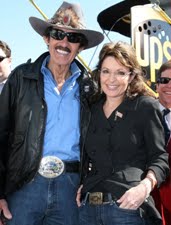 Great article by the "Curmudgeon Emeritus" on the Eternity Road:
Great article by the "Curmudgeon Emeritus" on the Eternity Road:A remarkable train of events has been set in motion, due to what would normally be deemed an uninteresting race in an obscure western New York Congressional district.
GOP-NY nominated Dede Scozzafava, a left-liberal New York assemblywoman, as its candidate for Congress from the 23rd district of New York. Scozzafava is in the notable position of running far to the left of her Democrat opponent: she favors abortion on demand, paid for by public funds; political action to combat "global warming;" the notorious "card check" provision for strengthening labor unions; and a host of other left-liberal nostrums. But NY-23 is considered a "safe" Republican district, which apparently has led Republican power-brokers in New York to underrate the importance of its candidate's convictions.
But nothing can guarantee perpetual obscurity in the age of the Internet. Word of this remarkable candidacy has spread far and wide, exciting outrage and disgust from conservatives from coast to coast. GOP-NY is under severe from conservatives who inexplicably appear to believe that a political party's candidates should bear some recognizable relation to its supposed ideology.
There is a conservative running for that Congressional seat: Doug Hoffman, the nominee of New York's tiny Conservative Party. That small party has usually limited itself to endorsing the Republican candidate, but not this time around. Hoffman's campaign has made much of Scozzafava's left-liberal positions, to Scozzafava's intense dismay, but despite that, and despite financial contributions to Hoffman's campaign from all over America, it seemed that the Republican nominee would carry the district in November...until yesterday.
On Thursday, October 21, in the year of Our Lord 2009, Doug Hoffman picked up a critical endorsement, from a supposed Republican.
We are witnessing the confluence of three rivers of dissatisfaction. Each of those streams carries enough power to perturb American politics dramatically. In combination, they could rewrite all the "rules" under which Americans have suffered since 1896.
First is the electorate's fatigue over "Tweedledumb or Tweedledumber" ballot choices. It's well understood that third-party candidates are hopeless causes -- that the major parties will do anything short of murder to prevent a third-party candidate from attaining the degree of recognition required to prevail over the political establishment. That's tightly tied to another current, but even on its own, it's elicited a great deal of cynicism about "insider politics."
Second is the disgust Americans have long felt about deceit in politics. Nearly all professional politicians lie so consistently and habitually that they might well be physiologically incapable of telling the truth. Surveys of opinion regularly report politicians' trustworthiness to rank below that of insurance salesmen and auto-body shops -- and if that doesn't strike you as a body blow, you've never been in an auto accident or had your phone number in the hands of an insurance agent.
Third is the great and widely distributed desire for relief from having to care about the decisions of politicians, especially politicians at the federal level. Americans cannot help but know that an increasing fraction of our money and freedom, and consequently our hopes for prosperity and security, lies not in our control but in the control of 540 men in Washington. What can be done to sway those men? Little. Diselecting them in favor of their nominal adversaries has failed to produce an improvement; the parties, whatever their platforms might say, are essentially united in action.
Lobbying? In comparison to the mighty forces that favor the Total State, our voices are hardly audible. Even the TEA Parties, numerous and well-attended as they've been, have had minuscule effect. All that remains is armed revolt.
George W. Bush defied the tradition of political deceit. All by itself, that was fuel enough to power him past an incumbent vice-president during a time of widespread prosperity and minimal international strife. If you've sought an explanation for why his opponents vilified him so continuously and viciously, you have it now: telling the truth in front of the microphones and cameras was too great a breaking of ranks to go unpunished.
Enter Sarah Heath Palin. This woman has it all:
1. She's an outsider to the political establishment, disliked and distrusted by the kingmakers within her own party;
2. She consistently and verifiably tells the truth, even when it's not particularly favorable to her own preferences;
3. She sincerely seeks to reduce the role of political power in American life, and has proved her bona fides with her actions in office.
The professional pols hate and fear Palin as no one since the 1966 rise of Ronald Wilson Reagan -- who, despite what many have been led to believe, was not well liked by Republican power-brokers.
Your Curmudgeon suspects it to be Divine intervention that Governor Palin was tapped for the vice-presidential nod in 2008, catapulting her to national prominence. We now know that neither John McCain nor anyone in his inner circle really liked Palin, as healthful as her nomination was to his otherwise lackluster campaign. They continue to marginalize her as best they can, to this day.
If anyone can reignite a sense of hope in American politics, especially among small-government types, Sarah Heath Palin is the one. She's sticking tightly to her core themes. She's displaying all the right moves. Her effectiveness at conveying a message via the New Media is indisputable. Her great beauty is merely icing on a superlative cake.
All by itself, Governor Palin's endorsement of Doug Hoffman has thrown the race for NY-23's Congressional seat into turmoil. Hoffman is now regarded by many as having no less of a chance for victory than Scozzafava. GOP-NY's power-brokers are aghast that this outsider, this Alaskan woman, could upset their applecarts so easily. They confront the prospect of irrelevance before a superior power, and it frightens them.
Chessplayers would call Sarah Heath Palin a "passed Pawn." She's bypassed the barricades erected by the major parties against non-Establishment voices. Seemingly insignificant in terms of official powers, she embodies the potential of a Queen. Such a Pawn, which starts the game as the lowliest of pieces, draws all the rest of the forces on the chessboard into its orbit. Granted, this Pawn's advance is being fought by both White and Black, but otherwise, the analogy holds.
Chessplayers will also tell you: Passed Pawns must be pushed!
Palin in 2012!



















No comments:
Post a Comment